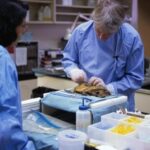The allure of forensic pathology, the intersection of medicine and law, often stems from a fascination with unraveling mysteries surrounding death. The work demands meticulous attention to detail, a strong stomach, and an unwavering commitment to justice. For aspiring forensic pathologists in Lebanon, the path is rigorous, demanding a blend of local education and international exposure to achieve proficiency in this specialized field.
I. Laying the Groundwork: Pre-Medical Education
The first step is completing pre-medical studies. A Bachelor’s degree in Biology, Chemistry, or a related science from a recognized Lebanese university is crucial. Courses should emphasize organic chemistry, genetics, and anatomy. These subjects build the fundamental knowledge base necessary for understanding the complexities of the human body and the disease processes that can affect it. Stellar academic performance is essential for gaining admission to medical school. Admission is highly competitive. Therefore, dedication to academics is paramount.
II. Medical School: The Foundation of Expertise
Successful completion of medical school is the next significant hurdle. Lebanese medical schools offer rigorous curricula, covering a broad range of medical specialties. The duration is typically six years. The initial years focus on basic sciences, followed by clinical rotations in various departments, including pathology. During these rotations, pay close attention to the intricacies of disease diagnosis and the role of pathology in patient care. Seek opportunities to work with pathologists, even if the focus isn’t forensic. Develop strong diagnostic acumen. Active participation in research projects related to pathology can also bolster your application for residency.
III. Pathology Residency: Sharpening Diagnostic Skills
Upon graduation from medical school, securing a residency in pathology is the next critical step. This typically involves a four-year program, encompassing both anatomic and clinical pathology. Anatomic pathology focuses on the examination of tissues and organs, while clinical pathology deals with laboratory analysis of bodily fluids. During the residency, trainees gain experience in performing autopsies, examining surgical specimens, and interpreting laboratory results. Crucially, seek out institutions that offer exposure to forensic pathology, even if it’s limited. Many Lebanese hospitals collaborate with international institutions. This may provide opportunities for observerships or elective rotations in forensic pathology departments abroad. Develop strong communication skills, as forensic pathologists frequently testify in court.
IV. Forensic Pathology Fellowship: Specializing in Medicolegal Death Investigation
After completing a pathology residency, further specialization is needed through a forensic pathology fellowship. A one- to two-year program provides intensive training in the medicolegal investigation of death. This includes conducting autopsies in cases of suspected homicide, suicide, or accidental death. Fellows learn to determine the cause and manner of death, document injuries, and collect evidence. Furthermore, they will gain familiarity with forensic toxicology, ballistics, and other related disciplines. Because dedicated forensic pathology fellowships may be limited in Lebanon, many aspiring forensic pathologists pursue these programs abroad, particularly in North America, Europe, or Australia. These programs offer exposure to high-volume caseloads and complex forensic cases. Return to Lebanon after completion of the fellowship. You will be more prepared to contribute to the development of forensic pathology services within the country.
V. Board Certification: Demonstrating Competency
Board certification is an important step to validate one’s expertise. The American Board of Pathology (ABP) offers certification in Forensic Pathology. Certification demonstrates a high level of competency and adherence to professional standards. Although based in the United States, ABP certification is widely recognized internationally and enhances credibility. Eligibility for the ABP exam requires completion of an accredited pathology residency and a forensic pathology fellowship. Preparation involves extensive self-study, review courses, and mock examinations. Maintaining certification requires ongoing continuing medical education and periodic recertification exams.
VI. Establishing a Career in Lebanon: Navigating the Landscape
Establishing a career in forensic pathology in Lebanon may require navigating a relatively underdeveloped system. Opportunities may exist within governmental agencies, such as the Ministry of Public Health or law enforcement agencies. Academic positions at medical schools or universities may also be available, combining teaching and research with forensic casework. Private practice opportunities might be limited initially, but could expand with growing awareness of the importance of forensic expertise. Networking with local medical and legal professionals is essential. Collaboration with international forensic organizations can facilitate professional development. Advocacy for improved forensic infrastructure and training programs within Lebanon is crucial for advancing the field.
VII. Continuing Education and Professional Development
Forensic pathology is a rapidly evolving field. Continuous learning is essential for staying abreast of new techniques and advances in medical knowledge. Attending conferences, workshops, and seminars is crucial. Subscribing to relevant journals and engaging in online learning platforms are also beneficial. Maintaining membership in professional organizations, such as the National Association of Medical Examiners (NAME), provides access to valuable resources and networking opportunities. Pursuing research and publishing findings contribute to the body of knowledge in forensic pathology and enhance professional standing.
VIII. Ethical Considerations and Professional Conduct
Forensic pathologists have a responsibility to adhere to the highest ethical standards. Objectivity, impartiality, and integrity are paramount. Maintaining confidentiality and respecting the dignity of the deceased are essential. Understanding the legal framework and rules of evidence is crucial for providing accurate and reliable testimony in court. Avoiding conflicts of interest and disclosing any potential biases are necessary for maintaining public trust. Seeking peer review and consultation in complex cases ensures the accuracy and reliability of findings.
Becoming a forensic pathologist in Lebanon is a challenging but rewarding path. It demands dedication, perseverance, and a commitment to upholding justice. By pursuing rigorous education, seeking international exposure, and adhering to ethical principles, aspiring forensic pathologists can contribute significantly to the medicolegal system in Lebanon.










Leave a Comment